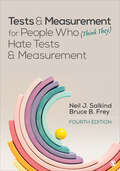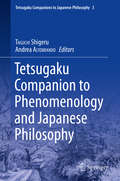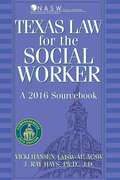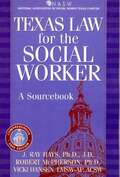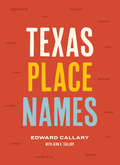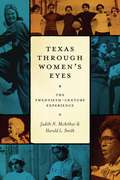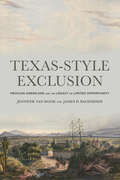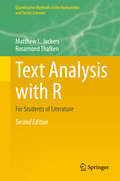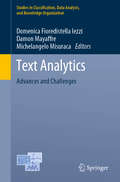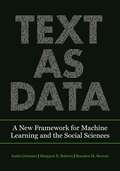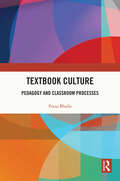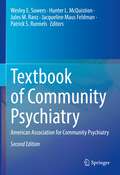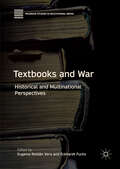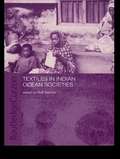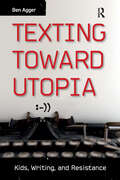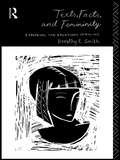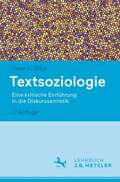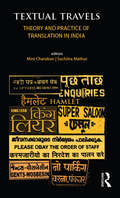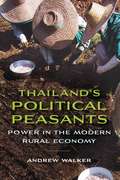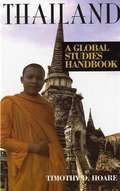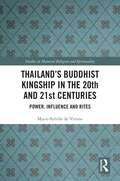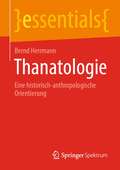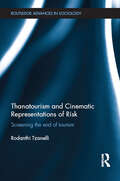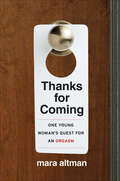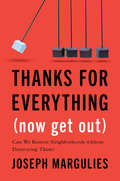- Table View
- List View
Tests & Measurement for People Who (Think They) Hate Tests & Measurement
by Bruce B. Frey Neil J. SalkindWith a signature, conversational writing style and straightforward presentation, Neil J. Salkind’s best-selling Tests & Measurement for People Who (Think They) Hate Tests & Measurement guides readers through an overview of categories of tests, the design of tests, the use of tests, and some of the basic social, political, and legal issues that the process of testing involves. New co-author Bruce B. Frey has streamlined the table of contents for ease of use; added more content on validity and reliability throughout; more closely connected standardized tests to classroom instruction, adding more on classroom assessment; and added a chapter on surveys and scale development. An instructor website includes a test bank and PowerPoint slides.
Tetsugaku Companion to Phenomenology and Japanese Philosophy (Tetsugaku Companions to Japanese Philosophy #3)
by Shigeru Taguchi Andrea AltobrandoThis volume addresses the impact of the introduction of phenomenology in Japan and its interaction with Japanese philosophy. It is well known that phenomenology was introduced at a very early stage in Japan. Furthermore, phenomenology still constitutes one of the main currents of thought in Japan. However, the specific way in which phenomenology has interacted with the indigenous Japanese tradition of thought and Japanese culture has until now not been addressed in great detail. This volume fills that gap. It discusses in detail the encounter and the interaction between Japanese thought and phenomenological reflection, with special regards to the topics of awareness and the self, the experience of otherness, ethics, and metaphysical issues. The book shows how phenomenology has served, and still serves, Japan to re-comprehend its “own” tradition and its specific form(s) of culture. At the same time, it offers an example of how different cultures and traditions can be both preserved and developed in their reciprocal action. More in general, it advances the philosophical debate beyond cultural enclosures and beyond mere scholasticism. The phenomenological tradition has always been open to new and alien ideas. An encounter with Japanese philosophy can offer a new challenge to actual phenomenological thinking.
Texas Law For The Social Worker: A 2016 Sourcebook
by Vicki Hansen J. Ray HaysTEXAS LAW FOR THE SOCIAL WORKER: A 2016 SOURCEBOOK provides licensed social workers, social work students, and professors with the key legal and policy issues specific to the state of Texas today. Issues directly affecting practitioners and their students have been carefully selected from statutes, case laws, official archives of the Attorney General Opinions and Open Records Opinions, the Social Work Practice Act, and the NASW Code of Ethics. No other compilation of such critical, up-to-date material exists for the state of Texas. New up-to-date material from 83rd Legislative Session!
Texas Law for the Social Worker: A Sourcebook
by Robert McPherson Jay Ray HaysTexas Law for the Social Worker provides licensed social workers, social work students, and professors with the key legal and policy issues specific to the state of Texas today. <p><p>Issues directly affecting practitioners and their students have been carefully selected from statutes, case laws, official archives of the Attorney General Opinions and Open Records Opinions. <p><p>No other compilation of such critical, up-to-date material exists for the state of Texas. Produced in collaboration with the Texas Psychological Association.
Texas Place Names
by Edward Callary Jean K. Callary&“[A] linguist . . . takes readers on a tour across the state, using names and language to tell its history.&” ―Alcalde Was Gasoline, Texas, named in honor of a gas station? Nope, but the name does honor the town&’s original claim to fame: a gasoline-powered cotton gin. Is Paris, Texas, a reference to Paris, France? Yes: Thomas Poteet, who donated land for the town site, thought it would be an improvement over &“Pin Hook,&” the original name of the Lamar County seat. Ding Dong&’s story has a nice ring to it; the name was derived from two store owners named Bell, who lived in Bell County, of course. Tracing the turning points, fascinating characters, and cultural crossroads that shaped Texas history, Texas Place Names provides the colorful stories behind these and more than three thousand other county, city, and community names. Drawing on in-depth research to present the facts behind the folklore, linguist Edward Callary also clarifies pronunciations (it&’s NAY-chis for Neches, referring to a Caddoan people whose name was attached to the Neches River during a Spanish expedition). A great resource for road trippers and historians alike, Texas Place Names alphabetically charts centuries of humanity through the enduring words (and, occasionally, the fateful spelling gaffes) left behind by men and women from all walks of life. &“[A] quite useful book.&” ―Austin American-Statesman
Texas Through Women's Eyes
by Judith N. Mcarthur Harold L. SmithTexas women broke barriers throughout the twentieth century, winning the right to vote, expanding their access to higher education, entering new professions, participating fully in civic and political life, and planning their families. Yet these major achievements have hardly been recognized in histories of twentieth-century Texas. By contrast, Texas Through Women’s Eyes offers a fascinating overview of women’s experiences and achievements in the twentieth century, with an inclusive focus on rural women, working-class women, and women of color. McArthur and Smith trace the history of Texas women through four eras. They discuss how women entered the public sphere to work for social reforms and the right to vote during the Progressive era (1900–1920); how they continued working for reform and social justice and for greater opportunities in education and the workforce during the Great Depression and World War II (1920–1945); how African American and Mexican American women fought for labor and civil rights while Anglo women laid the foundation for two-party politics during the postwar years (1945–1965); and how second-wave feminists (1965–2000) promoted diverse and sometimes competing goals, including passage of the Equal Rights Amendment, reproductive freedom, gender equity in sports, and the rise of the New Right and the Republican party.
Texas-Style Exclusion: Mexican Americans and the Legacy of Limited Opportunity
by James D. Bachmeier Jennifer Van HookWhile Americans largely support legal immigration, this support is conditional on the basis that immigrants do not make use of public assistance. Previous generations of immigrants, such as European-origin Industrial Era immigrants, came to U.S. impoverished, worked hard, and achieved the American Dream seemingly on their own. Mexican immigrants, the nation’s largest contemporary immigrant group, are often viewed with suspicion and are accused of being dependent on the government and refusing to integrate into American society the “right way.” In Texas-Style Exclusion, sociologists Jennifer Van Hook and James D. Bachmeier investigate such claims by comparing how American society has responded to different groups of immigrants over time. Drawing on census and archival data on the quality of public schooling, Van Hook and Bachmeier find that Industrial Era European immigrants, who were primarily located in the northeastern U.S., benefited from programs and policies championed by the Americanization and Progressive movements. The Americanization movement sought to help acclimate new arrivals and transform “foreigners” into “Americans” by providing night school programs to promote civic integration and basic education, as well as other services. The Progressive movement, which aimed to improve education, work, and health conditions, sought to expand investment in public schools and make primary and secondary schooling mandatory, which kept working class children in school as opposed to entering the workforce. This access to education allowed for integration and astonishing intergenerational mobility. Mexican immigrants in the 1920s and 1930s, the majority of whom resided in Texas, had radically different experiences from their European counterparts. Mexicans in Texas were subjected to racism, segregation, labor exploitation, and intentional school failures. This resulted in tremendous generational disadvantage that persists to the current day. Mexicans from this cohort who left Texas for states with strong Americanization and Progressive movements saw improved educational outcomes and integration. Additionally, Mexicans who immigrated after the Civil Rights Movement saw significantly greater inter-generational mobility and educational attainment than earlier cohorts due to the protections provided by civil rights laws. Van Hook and Bachmeier conclude that whether one is optimistic or pessimistic about the integration of Mexican Americans depends on when and where one looks. Texas-Style Exclusion is an engaging examination of policies and practices that have been glossed over and forgotten that promoted mobility and integration for certain immigrant groups and impeded them for others.
Text Analysis with R: For Students of Literature (Quantitative Methods in the Humanities and Social Sciences)
by Matthew L. Jockers Rosamond ThalkenNow in its second edition, Text Analysis with R provides a practical introduction to computational text analysis using the open source programming language R. R is an extremely popular programming language, used throughout the sciences; due to its accessibility, R is now used increasingly in other research areas. In this volume, readers immediately begin working with text, and each chapter examines a new technique or process, allowing readers to obtain a broad exposure to core R procedures and a fundamental understanding of the possibilities of computational text analysis at both the micro and the macro scale. Each chapter builds on its predecessor as readers move from small scale “microanalysis” of single texts to large scale “macroanalysis” of text corpora, and each concludes with a set of practice exercises that reinforce and expand upon the chapter lessons. The book’s focus is on making the technical palatable and making the technical useful and immediately gratifying. Text Analysis with R is written with students and scholars of literature in mind but will be applicable to other humanists and social scientists wishing to extend their methodological toolkit to include quantitative and computational approaches to the study of text. Computation provides access to information in text that readers simply cannot gather using traditional qualitative methods of close reading and human synthesis. This new edition features two new chapters: one that introduces dplyr and tidyr in the context of parsing and analyzing dramatic texts to extract speaker and receiver data, and one on sentiment analysis using the syuzhet package. It is also filled with updated material in every chapter to integrate new developments in the field, current practices in R style, and the use of more efficient algorithms.
Text Analytics: Advances and Challenges (Studies in Classification, Data Analysis, and Knowledge Organization)
by Domenica Fioredistella Iezzi Damon Mayaffre Michelangelo MisuracaFocusing on methodologies, applications and challenges of textual data analysis and related fields, this book gathers selected and peer-reviewed contributions presented at the 14th International Conference on Statistical Analysis of Textual Data (JADT 2018), held in Rome, Italy, on June 12-15, 2018. Statistical analysis of textual data is a multidisciplinary field of research that has been mainly fostered by statistics, linguistics, mathematics and computer science. The respective sections of the book focus on techniques, methods and models for text analytics, dictionaries and specific languages, multilingual text analysis, and the applications of text analytics. The interdisciplinary contributions cover topics including text mining, text analytics, network text analysis, information extraction, sentiment analysis, web mining, social media analysis, corpus and quantitative linguistics, statistical and computational methods, and textual data in sociology, psychology, politics, law and marketing.
Text as Data: A New Framework for Machine Learning and the Social Sciences
by Justin Grimmer Margaret E. Roberts Brandon M. StewartA guide for using computational text analysis to learn about the social world From social media posts and text messages to digital government documents and archives, researchers are bombarded with a deluge of text reflecting the social world. This textual data gives unprecedented insights into fundamental questions in the social sciences, humanities, and industry. Meanwhile new machine learning tools are rapidly transforming the way science and business are conducted. Text as Data shows how to combine new sources of data, machine learning tools, and social science research design to develop and evaluate new insights.Text as Data is organized around the core tasks in research projects using text—representation, discovery, measurement, prediction, and causal inference. The authors offer a sequential, iterative, and inductive approach to research design. Each research task is presented complete with real-world applications, example methods, and a distinct style of task-focused research.Bridging many divides—computer science and social science, the qualitative and the quantitative, and industry and academia—Text as Data is an ideal resource for anyone wanting to analyze large collections of text in an era when data is abundant and computation is cheap, but the enduring challenges of social science remain.Overview of how to use text as dataResearch design for a world of data delugeExamples from across the social sciences and industry
Textbook Culture: Pedagogy and Classroom Processes
by Pooja BhallaThis volume captures the essence of schooling in a structural manner and explores the classroom life in the larger schooling context. The emphasis is to uncover the necessary framework of classroom that is significant to understand the place of textbooks in the Indian school education system. By the use of ethnographic vignettes, it brings out the multiple patterns of teacher- student's interactions as they occur in different textbook-based situations. Through this, it sheds light on the primacy of the textbook approach in the classroom processes.The book also investigates the ways through which the students respond to the different pedagogic situations. In doing so, it explores the notions of student boredom, alienation, inclusion and exclusion, and the array of student-textbook experiences that are pivotal to the shape and reshape the classroom processes in the larger pedagogical discourses.This book will be of interest to researchers, students, and teachers of education studies, sociology and politics of education, teacher education, childhood and youth studies, and urban studies. It will also be useful for education policymakers, and professionals in the development sector.
Textbook of Community Psychiatry: American Association for Community Psychiatry
by Jacqueline Maus Feldman Wesley E. Sowers Jules M. Ranz Hunter L. McQuistion Patrick S. RunnelsThe second edition of the AACP's (American Association for Community Psychiatry) Textbook of Community Psychiatry is a welcome update of this notable work that comprehensively presents the state of the art in this field. Along with continuously evolving scientific advances and principles of clinical care, community psychiatry must respond to shifts in public policy as well as economic climate. The past decade has witnessed significant political and social changes, including climate change, immigration levels, technological advancement, the influence of social media and the rise of political unrest. This new edition reflects these wider changes, incorporating new chapters and enhancing previous ones. It remains the standard text for certification of those working in healthcare and social welfare systems design and delivery of services. Readers will gain knowledge of:Basic pillars of the fieldEvidence based interventionsTelepsychiatry and technological aidsTrauma informed servicesIntegrated health systemsSocial determinants of healthStructural discrimination
Textbooks and War: Historical and Multinational Perspectives (Palgrave Studies in Educational Media)
by Eckhardt Fuchs Eugenia Roldán VeraThis volume reflects on the role played by textbooks in the complex relationship between war and education from a historical and multinational perspective, asking how textbook content and production can play a part in these processes. It has long been established that history textbooks play a key role in shaping the next generation’s understanding of both past events and the concept of ‘friend’ and ‘foe’. Considering both current and historical textbooks, often through a bi-national comparative approach, the editors and contributors investigate various important aspects of the relationships between textbooks and war, including the role wars play in the creation of national identities (whether the country is on the winning or losing side), the effacement of international wars to highlight a country’s exceptionalism, or the obscuring of intra-national conflict through the ways in which a civil war is portrayed. This pioneering book will be of interest and value to students and scholars of textbooks, educational media and the relationships between curricula and war.
Textiles in Indian Ocean Societies (Routledge Indian Ocean Series)
by Ruth BarnesTextiles in Indian Ocean Societies considers the importance of trade, and the transformation of the meaning of objects has the move between different cultures. It also addresses issues of gender, ethnic and religious identity, and economic status. The book covers a broad geographic range from East Africa to Southeast Asia, and references a number of disciplines such as anthropology, art history and history.This volume is timely, as both the social sciences and historical studies have developed a new interest in material culture. Edited by a foremost expert in the region, it will add considerably to our understanding of historical and current societies in the Indian Ocean region.
Texting Toward Utopia: Kids, Writing, and Resistance
by Ben AggerThis book examines the contemporary era where parents complain that children today don't do their homework because they are distracted by the Internet, texting, and video games. Texting Toward Utopia presents the writings of todays children and develops the argument that this is actually a time of mass literary, in which young people write furiously, albeit often below the adult radar. Agger argues that where texting replaces textbooks, the writing may be emoticon-laden, slangy, or terse, but it is still profound, as children (and their parents) engage in resistance and write for a better world. This book is a guide to understanding the meeting point between a new generation of children and new communication technologies.
Texts, Facts and Femininity: Exploring the Relations of Ruling
by Dorothy E. Smith'A crucial book for feminists, for sociology and the new "political anthropological historical school". It informs us how we are differently "situated" in and through social relations, which texts and images mediate, organise and construct.' Philip Corrigan, Professor of Applied Sociology, Exeter University Dorothy E. Smith is Professor of Sociology in Education, Ontario Institute for Studies in Education, Toronto. She is the author of The Everyday World as Problematic: A Feminist Sociology.
Textsoziologie: Eine kritische Einführung in die Diskurssemiotik
by Peter V. ZimaIm Anschluss an Adorno, Bachtin und Greimas’ Strukturale Semiotik analysiert Zima die Einwirkung sozialer Entwicklungen und Konfliktlinien auf literarische (und theoretische) Diskurse. Dabei geht es ebenso um Gattungsentwicklungen wie um semantische und syntaktische Strukturen einzelner Texte. Stets wird versucht, Gesellschaft und Literatur über die Sprache miteinander zu vermitteln. Der Band bietet vertiefte Analysen zu Proust, Musil und Kafka. Die Neuauflage enthält neue Kapitel zu den Begriffen der soziolinguistischen Situation, des Soziolekts sowie der Intertextualität und dehnt die Textsoziologie auf die Institutionalisierung literarischer Sprachen aus.
Textual Travels: Theory and Practice of Translation in India
by Mini Chandran Suchitra MathurThis book presents a comprehensive account of the theory and practice of translation in India in combining both its functional and literary aspects. It explores how the cultural politics of globalization is played out most powerfully in the realm of popular culture, and especially the role of translation in its practical facets, ranging from the fields of literature and publishing to media and sports.
Thailand's Political Peasants
by Andrew WalkerWhen a populist movement elected Thaksin Shinawatra as Prime Minister of Thailand in 2001, many of the country’s urban elite dismissed the outcome as just another symptom of rural corruption, a traditional patronage system dominated by local strongmen pressuring their neighbors through political bullying and vote-buying. InThailand’s Political Peasants, however, Andrew Walker argues that the emergence of an entirely new socioeconomic dynamic has dramatically changed the relations of Thai peasants with the state, making them a political force to be reckoned with. Whereas their ancestors focused on subsistence, this generation of middle-income peasants seeks productive relationships with sources of state power, produces cash crops, and derives additional income through non-agricultural work. In the increasingly decentralized, disaggregated country, rural villagers and farmers have themselves become entrepreneurs and agents of the state at the local level, while the state has changed from an extractor of taxes to a supplier of subsidies and a patron of development projects. Thailand’s Political Peasantsprovides an original, provocative analysis that encourages an ethnographic rethinking of rural politics in rapidly developing countries. Drawing on six years of fieldwork in Ban Tiam, a rural village in northern Thailand, Walker shows how analyses of peasant politics that focus primarily on rebellion, resistance, and evasion are becoming less useful for understanding emergent forms of political society.
Thailand: A Global Studies Handbook
by Timothy D. HoareHoare (humanities and religion, Johnson County Community College, Overland Park, Kansas) draws on his own experience and knowledge from numerous visits to Thailand, dissertation field research in Bangkok, and 15-plus years of marriage to a Thai native in creating a reference text for students, travelers, business people, and interested general readers. The text includes narrative chapters on Thai history, geography, demographics, economy, social institutions, and contemporary issues. It also contains a timeline of key events in Thailand's history; an alphabetical listing of significant people, places, and events; a concise guide to Thai language, food, and etiquette; a directory of business, cultural, government, and tourist organizations; and an annotated bibliography of print and non-print resources.
Thailand’s Buddhist Kingship in the 20th and 21st Centuries: Power, Influence and Rites (Studies in Material Religion and Spirituality)
by Marie-Sybille de VienneBased on two decades of fieldwork, including over a hundred interviews with various political and economic actors at different social levels, as well as documentary and media analysis, this volume presents an account of the Buddhist monarchy in Thailand, offering a sociology of elites, an analysis of the economic influence of the Crown and an examination of the magic and ritual dimension of kingship. An exploration of the role and status of the Palace over the last century, whether as a guarantor of democracy, a symbol of stability, a source of power or an object of popular discontent, Thailand’s Buddhist Kingship in the 20th and 21st Centuries will appeal to scholars of sociology and anthropology with interests in material religion, politics and Southeast Asian studies.
Thanatologie: Eine historisch-anthropologische Orientierung (essentials)
by Bernd HerrmannBestattungsritual und Behandlung der Toten sind elementare Merkmale einer Kultur. Eine Gesellschaft gibt sich im Bestattungsritual, in der Behandlung der Toten und in den Vor- wie Nachbereitungen der Beisetzung über die soziale Identität des Verstorbenen und über den Zusammenhalt der Gemeinschaft Rechenschaft. In der Thanatologie werden mit den Mitteln von Archäologie und Prähistorischer Anthropologie die praxeologischen Zeichen rekonstruiert, soweit sie materielle Spuren im Quellenmaterial und in dessen Umfeld hinterlassen haben. Dargestellt sind die gängigen Überlieferungsformen von menschlichen Überresten und mögliche Zugänge zur Dekodierung der in ihnen wie in den Auffindesituationen enthaltenen Zeichen. Mit Hinweisen zu den erforderlichen erkenntnistheoretischen Erwägungen bietet das essential insgesamt einen thematischen Überblick und Wegweiser.
Thanatourism and Cinematic Representations of Risk: Screening the End of Tourism (Routledge Advances in Sociology)
by Rodanthi TzanelliIn today’s world, the need to eliminate natural and human-made disasters has been at the forefront of national and international socio-political agendas. The management of risks such as terrorism, labour strikes, protests and environmental degradation has become pivotal for countries that depend on their economy’s tourist sector. Indeed, there is fear that that ‘the end of tourism’ might be nigh due to inadequate institutional foresight. Yet, in designing relevant policies to tackle this, arts such as that of filmmaking have yet to receive due consideration. This book adopts an unorthodox approach to debates about ‘the end of tourism’. Through twenty-first century cinematic narratives of symbolically interconnected ‘risks’ it considers how art envisages the future of humanity’s well-being. These ‘risks’ include: migration as an infectious disease; alien incursions as racialized labour mobilities; cyborg rebellion as the fear of post-colonial otherness; and zombie anthropophagy as the replacement of rooted identities by nomadic lifestyles. Such filmic scenarios articulate the futuristic survival of community as the triumph of the technological human over otherness, and provide a means to debate societal risks that weave identity politics into unequal mobilities. This book will appeal to researchers and students interested in mobilities theory, tourism and travel theory, film studies and aesthetics, globalisation studies, race, labour and migration.
Thanks for Coming: One Young Woman's Quest for an Orgasm
by Mara AltmanA young woman chronicles her search for an orgasm—and the elusive connections between sex and love—in this uproarious and touching memoir.“[Altman] writes about the parade of research scientists, professional dominants, and prospective boyfriends with self-deprecating humor and a grudging recognition of what others peg as her sexual and emotional immaturity. . . . Inspiring.” —Publishers WeeklyTwenty-six-year-old Mara Altman wanted to know what all the screaming was about. She’d lost her virginity at seventeen; grown up in southern California with sexually free parents; had lovers in India, Burma, and Peru; and spent a year in Bangkok observing all manner of depravity. And yet she was an attractive, successful, single woman in New York who’d never had an orgasm.And so she embarked on a wildly funny, emotionally resonant odyssey—a journey both inside and outside herself—only to discover that, for Mara, orgasm was connected to a part of her that no vibrator could reach. Thanks for Coming is one woman’s look at our obsession with and anxiety over the female orgasm. Her quest to get her own yields poignant results that will surprise even the sexually awakened among us. From sex shows to sex conventions, from a therapist's couch to her own couch, from the bedroom to the bar, Mara Altman proves to be a guide as hilarious as she is investigative.
Thanks for Everything (Now Get Out): Can We Restore Neighborhoods without Destroying Them?
by Joseph MarguliesWhen a distressed urban neighborhood gentrifies, all the ratios change: poor to rich; Black and Brown to white; unskilled to professional; vulnerable to secure. Vacant lots and toxic dumps become condos and parks. Upscale restaurants open and pawn shops close. But the low-income residents who held on when the neighborhood was at its worst, who worked so hard to make it better, are gradually driven out. For them, the neighborhood hasn&’t been restored so much as destroyed. Tracing the history of Olneyville, a neighborhood in Providence, Rhode Island, that has traveled the long arc from urban decay to the cusp of gentrification, Joseph Margulies asks the most important question facing cities today: Can we restore distressed neighborhoods without setting the stage for their destruction? Is failure the inevitable cost of success? Based on years of interviews and on-the-ground observation, Margulies argues that to save Olneyville and thousands of neighborhoods like it, we need to empower low-income residents by giving them ownership and control of neighborhood assets. His model for a new form of neighborhood organization—the &“neighborhood trust&”—is already gaining traction nationwide and promises to give the poor what they have never had in this country: the power to control their future.
